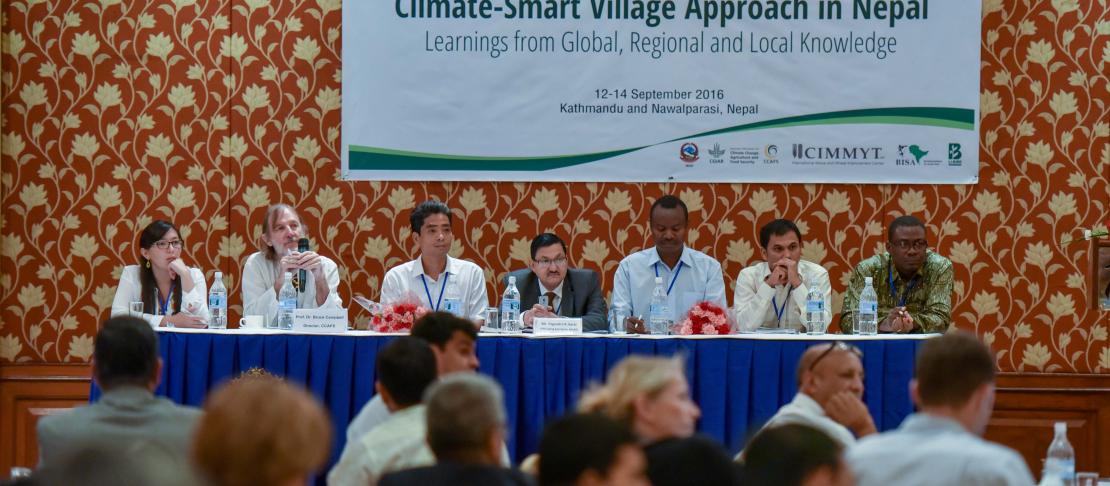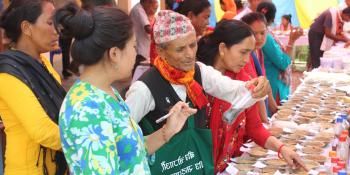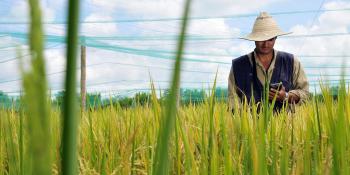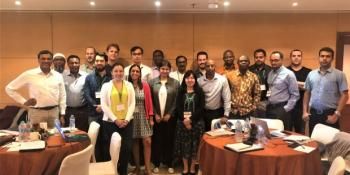Adaptation through the Climate-Smart Village approach in Nepal

Global, regional, national and local experts met in Nepal to discuss how climate-smart agriculture could be scaled-out through the Climate-Smart Village approach.
Ministry of Agricultural Development (MoAD) of Nepal along with Local Initiatives for Biodiversity, Research and Development (LI-BIRD) and the CGIAR Research Program on Climate Change, Agriculture and Food Security (CCAFS) South Asia program, organized an international workshop on 12-14 September 2016. The workshop was aimed to bring key stakeholders together with leading experts from different parts of the world (Latin America, Africa, Asia, and South Asia) to discuss about Climate-Smart Village (CSV) program for Nepal. It also focused on fostering South-South learning and exchange of experiences from other regions that could be relevant for the country.
Nearly 80 participants from the Nepal government, private firms, universities, local and global development agencies, and media attended the three day workshop. Some of the institutions represented were: the Department of Agriculture, Department of Environment, Nepal Agricultural Research Council (NARC), International Maize and Wheat Improvement Center (CIMMYT), International Food Policy Research Institute (IFPRI), International Livestock Research Institute (ILRI), International Crops Research Institute for the Semi-Arid Tropics (ICRISAT), Wageningen UR, USAID, Indian Tobacco Company (ITC), Climate and Development Knowledge Network (CDKN), International Center for Tropical Agriculture (CIAT), Bihar Agriculture Management & Extension Training Institute (BAMETI), World Fish, World Agroforestry Centre (ICRAF), International Rice Research Institute (IRRI), Institute of Agriculture and Animal Science (IAAS), Agriculture and Forestry University (AFU), World Food Programme's (WFP), Nepal Development Research Center (NDRI), Practical Action Consulting (PAC), and Asha Nepal.
This workshop focused on exchanging learnings and experiences from other regions and countries that could be relevant for Nepal. A field visit to CCAFS-supported CSVs in the Terai region of Nepal (Nawalparasi) was included in the program. The main objectives of the workshop were to:
- Demonstrate the Climate-Smart Village approach for scaling out CSA in Nepal.
- Foster South-South learning and exchange to support the development of a national program on climate adaptation through the CSV approach in line with the Agriculture Development Strategy of the country.
- Sensitize national and international stakeholders about Nepal government’s priorities on Agriculture Development Strategy on climate risk management.
The workshop began with a field trip to the CSVs located in Nawalparasi district of Nepal. The participants were divided into two groups and each group was supposed to visit two CSV sites. The main objective of the field visit was to demonstrate participatory implementation of CSV approach in collaboration with local communities, government, non-government and private sector partners in Nepal. This field visit has offered opportunities to see how the different components of the CSV approach are implemented and functioning in the farm communities. The main focus of the field visit were:
- To witness implementation of single or/and combination of climate-smart options in the farmers field;
- To observe local collaboration in the implementation of CSV approach;
- To reach farmers and local key stakeholders and get feedback about CSV approach
Plenary and parallel group discussions, combined with field visits to the CSV sites aided to reflect the CSV approach and its implementation in the farm communities. Participants in the CSV field visit have directly observed implementation of different climate-smart interventions in the farmers field, involvement of farmers and women’s groups, integration of the CSV approach in the local development program and involvement and support from local government offices and private sector organization such as ICT company, seed suppliers and solar companies. The participants also have the opportunity to interact directly with farmers and local stakeholders and collect feedback.
Plenary session primarily focused on CSV framework and its application in different regions and Nepal. Various approaches of CSVs across the regions were highlighted in the South-South Learning session of the workshop. Parallel sessions were organized to discuss on four pertinent issue of scaling out climate smart agriculture through CSV approach: i) CSA Practices and Technologies, ii) ICT and Insurance, iii) Institutions and Policies on CSA, and iv) Gender and Social Inclusion. Participates have discussed on current challenges, potential options and way forward to implement CSV in Nepal.
Bikash Paudel is Senior Programme Manager at LI-BIRD Nepal, Nitya Chanana is Research consultant at CCAFS South Asia and Arun Khatri-Chhetri is Science Officer at CCAFS South Asia.



